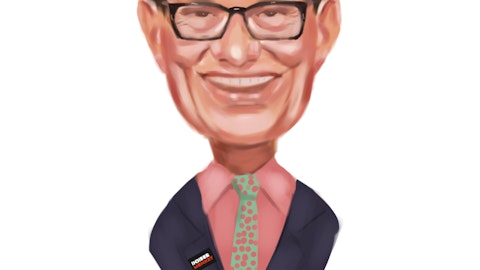Matthew Moon: Okay. Great. And then in your prepared remarks and I think in your press release as well, you cited delays, I guess, towards the end of the year in terms of elongated time lines to deal closure. I guess is there any kind of common thread and through line that drove those delays and push back and is it fair to assume from your comments that we still should anticipate these deals to close relatively soon and kind of into the first half of 2023. Just kind of curious on both the factors and the expected timing of those elongated time lines?
Scott Bok: Okay. Good question. Look, the factors I think in what is obviously a very volatile market, it’s a little bit of everything. I mean, I think regulators are not succeeding and blocking a lot of deals, but they certainly, I think, around the world have been a little bit slower to sort of approve deals and let them flow through. So that’s one factor. I think the difficulty of getting financing is going to slow down some deals. But if you’re creative and determined, companies and sponsors are finding ways to get things done. And then just the incredible volatility in markets, whether it’s currencies, which would have been extraordinary volatile or the stock market, it makes it more complicated to sort of have that final negotiation and set a price and get people to sign the contract.
So I think all those are factors in and things taking a bit longer than usual to get done towards the latter part of last year. But yes, look, I’m encouraged by the fact that I don’t feel like really anything we were working on towards anything of significance as we’re working on towards the end of the year, it died. I think it’s just a matter of things taking a bit longer to get to the finish line than we probably would have guessed in the fall.
Matthew Moon: Got it. And then last 1 for me, just more of a clarifying question as it relates to the non-comp side. It sounds like you had some one-offs in there that — you did highlight as it relates to the build-out of the London office as well as — it sounds like a co-advisory fee in there as well. Just curious if you could quantify any of those impacts as it relates to 2022 non-comp base that you don’t really expect to recur in 2023 as we look to our models?
Scott Bok: I mean what I would say for non-comp for your modeling purposes, I think in our investor presentation, we continue to show our target, I think, $55 million to $60 million, which is what it has been, and we did fall in that range this year. And we — the reason we didn’t change that. I mean, clearly, we think a lot of — a bunch of these kind of one-offs won’t happen again certainly, but won’t have duplicative rent of a major office again for a while, having just had that. But we think that there will clearly be more travel as M&A activity picks up. And that’s all going to kind of net out to a number probably very similar in 2023 to what we had in 2022 and 2021 for that matter. It’s been — we’ve managed those costs pretty well.
We’ve had some one-offs that were maybe offset by less travel. Now the travel is coming back and some of the one-offs are going away. So we’re kind of in a total non-comp cost basis, we’ve been pretty much trading water for a while, which I think is a good — is a positive thing.
Operator: Our next question comes from James Yaro from Goldman Sachs.
James Yaro: Scott, maybe we could just start on the strategic versus sponsor dichotomy. Maybe you just weigh up the strength of the dialogue across those 2 different groups of buyers and the differences between them?





